Essay on Argumentive PDF
VerifiedAdded on 2021/09/22
|6
|1398
|98
AI Summary
Contribute Materials
Your contribution can guide someone’s learning journey. Share your
documents today.
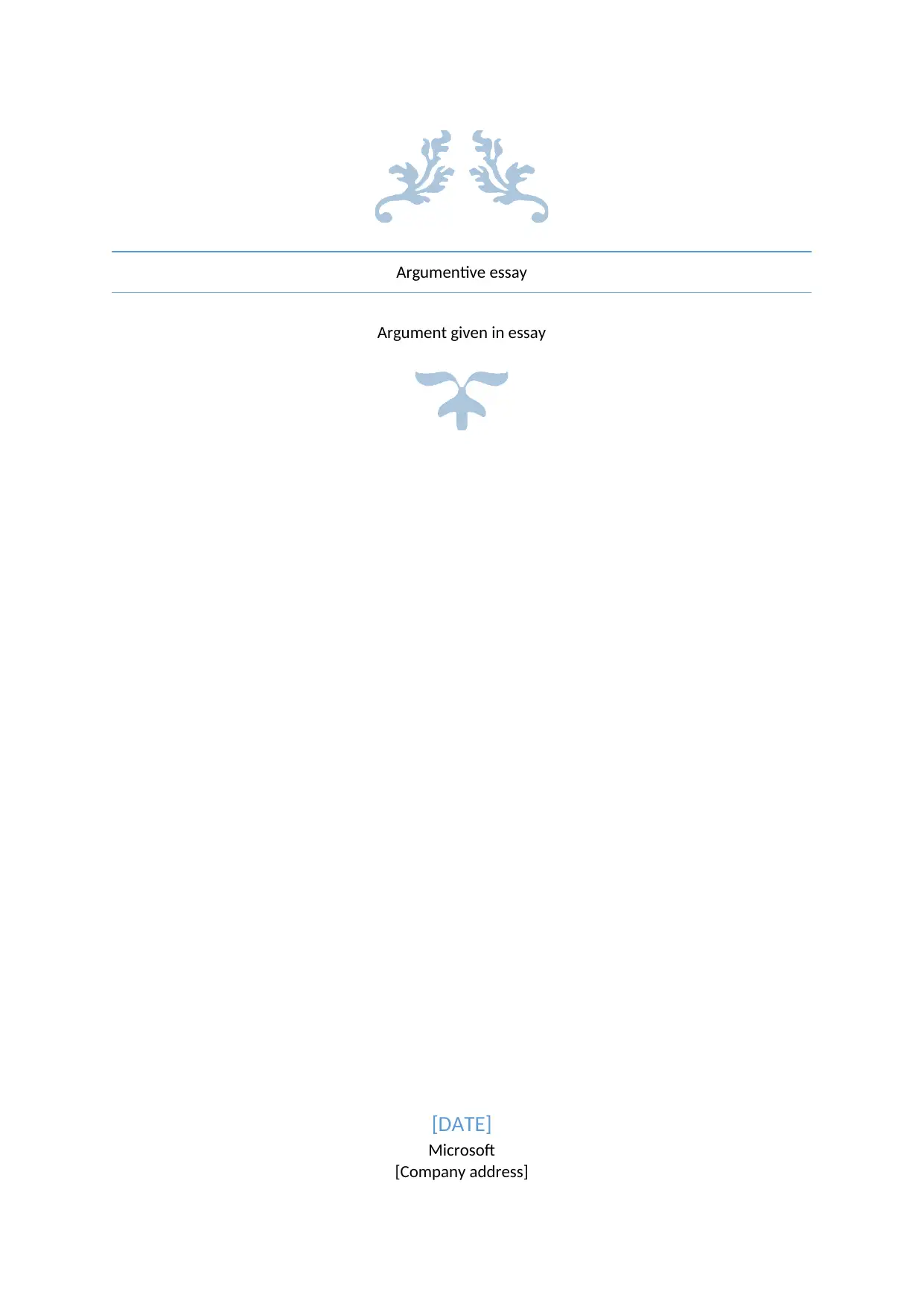
Argumentive essay
Argument given in essay
[DATE]
Microsoft
[Company address]
Argument given in essay
[DATE]
Microsoft
[Company address]
Secure Best Marks with AI Grader
Need help grading? Try our AI Grader for instant feedback on your assignments.
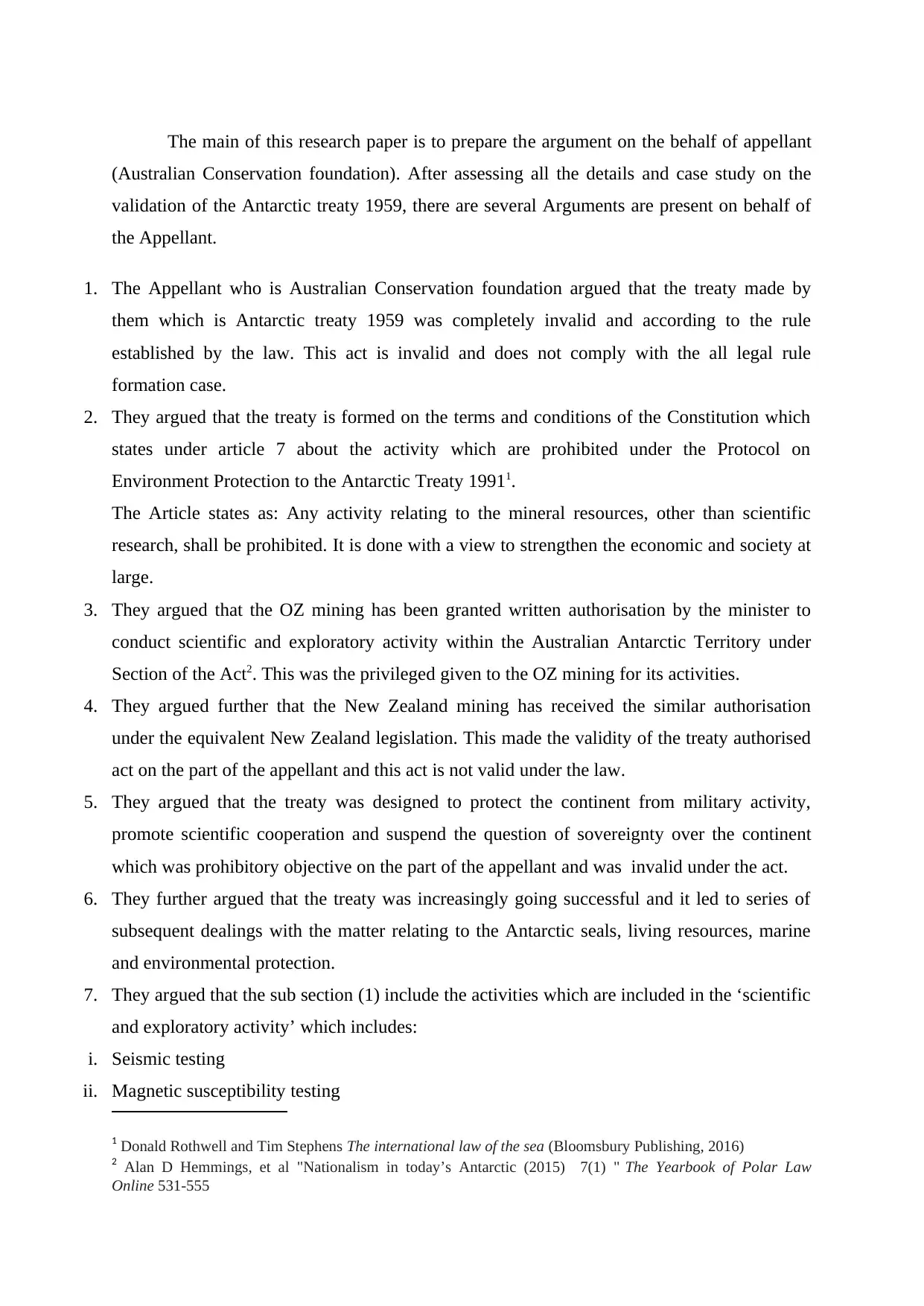
The main of this research paper is to prepare the argument on the behalf of appellant
(Australian Conservation foundation). After assessing all the details and case study on the
validation of the Antarctic treaty 1959, there are several Arguments are present on behalf of
the Appellant.
1. The Appellant who is Australian Conservation foundation argued that the treaty made by
them which is Antarctic treaty 1959 was completely invalid and according to the rule
established by the law. This act is invalid and does not comply with the all legal rule
formation case.
2. They argued that the treaty is formed on the terms and conditions of the Constitution which
states under article 7 about the activity which are prohibited under the Protocol on
Environment Protection to the Antarctic Treaty 19911.
The Article states as: Any activity relating to the mineral resources, other than scientific
research, shall be prohibited. It is done with a view to strengthen the economic and society at
large.
3. They argued that the OZ mining has been granted written authorisation by the minister to
conduct scientific and exploratory activity within the Australian Antarctic Territory under
Section of the Act2. This was the privileged given to the OZ mining for its activities.
4. They argued further that the New Zealand mining has received the similar authorisation
under the equivalent New Zealand legislation. This made the validity of the treaty authorised
act on the part of the appellant and this act is not valid under the law.
5. They argued that the treaty was designed to protect the continent from military activity,
promote scientific cooperation and suspend the question of sovereignty over the continent
which was prohibitory objective on the part of the appellant and was invalid under the act.
6. They further argued that the treaty was increasingly going successful and it led to series of
subsequent dealings with the matter relating to the Antarctic seals, living resources, marine
and environmental protection.
7. They argued that the sub section (1) include the activities which are included in the ‘scientific
and exploratory activity’ which includes:
i. Seismic testing
ii. Magnetic susceptibility testing
1 Donald Rothwell and Tim Stephens The international law of the sea (Bloomsbury Publishing, 2016)
2 Alan D Hemmings, et al "Nationalism in today’s Antarctic (2015) 7(1) " The Yearbook of Polar Law
Online 531-555
(Australian Conservation foundation). After assessing all the details and case study on the
validation of the Antarctic treaty 1959, there are several Arguments are present on behalf of
the Appellant.
1. The Appellant who is Australian Conservation foundation argued that the treaty made by
them which is Antarctic treaty 1959 was completely invalid and according to the rule
established by the law. This act is invalid and does not comply with the all legal rule
formation case.
2. They argued that the treaty is formed on the terms and conditions of the Constitution which
states under article 7 about the activity which are prohibited under the Protocol on
Environment Protection to the Antarctic Treaty 19911.
The Article states as: Any activity relating to the mineral resources, other than scientific
research, shall be prohibited. It is done with a view to strengthen the economic and society at
large.
3. They argued that the OZ mining has been granted written authorisation by the minister to
conduct scientific and exploratory activity within the Australian Antarctic Territory under
Section of the Act2. This was the privileged given to the OZ mining for its activities.
4. They argued further that the New Zealand mining has received the similar authorisation
under the equivalent New Zealand legislation. This made the validity of the treaty authorised
act on the part of the appellant and this act is not valid under the law.
5. They argued that the treaty was designed to protect the continent from military activity,
promote scientific cooperation and suspend the question of sovereignty over the continent
which was prohibitory objective on the part of the appellant and was invalid under the act.
6. They further argued that the treaty was increasingly going successful and it led to series of
subsequent dealings with the matter relating to the Antarctic seals, living resources, marine
and environmental protection.
7. They argued that the sub section (1) include the activities which are included in the ‘scientific
and exploratory activity’ which includes:
i. Seismic testing
ii. Magnetic susceptibility testing
1 Donald Rothwell and Tim Stephens The international law of the sea (Bloomsbury Publishing, 2016)
2 Alan D Hemmings, et al "Nationalism in today’s Antarctic (2015) 7(1) " The Yearbook of Polar Law
Online 531-555
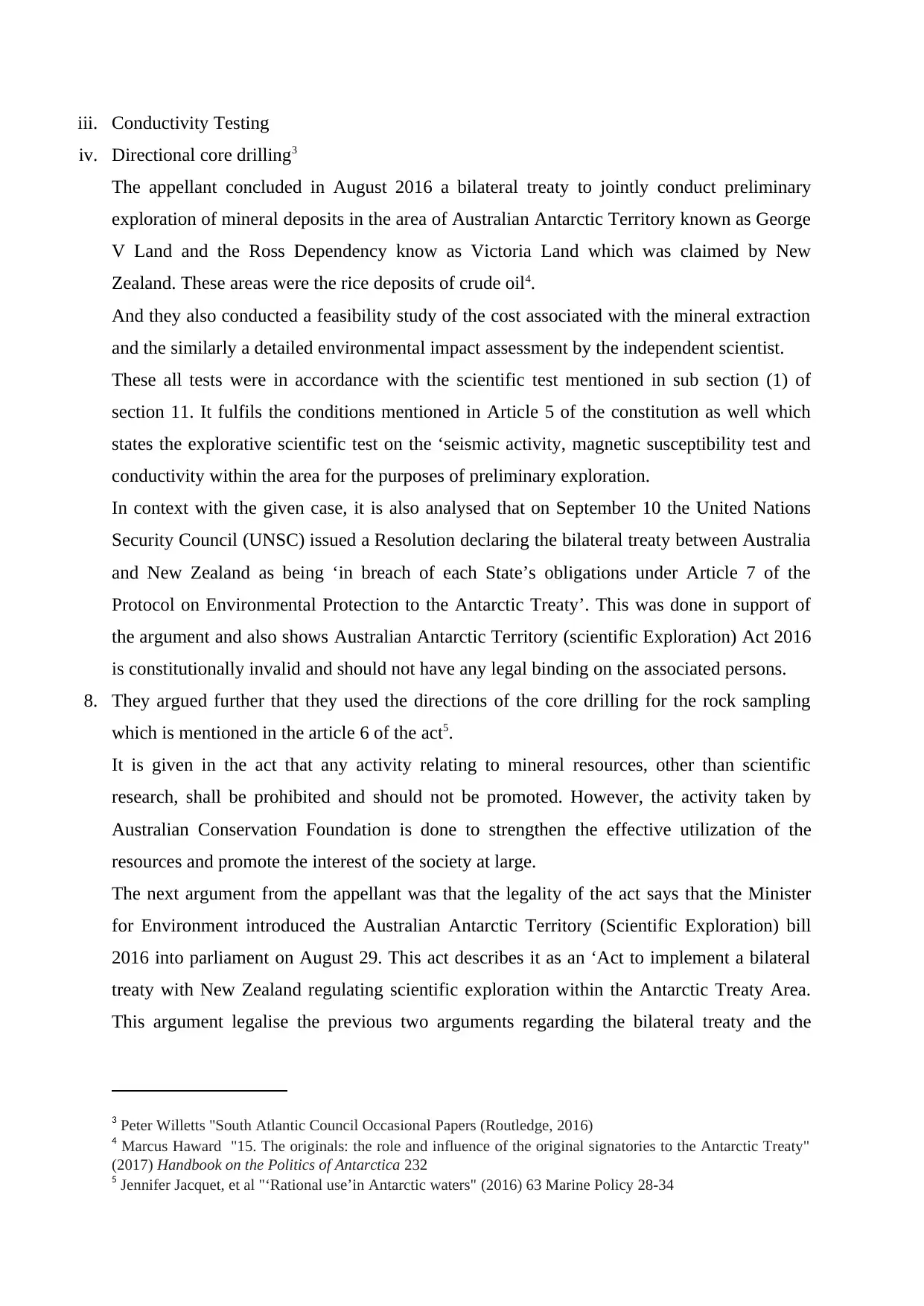
iii. Conductivity Testing
iv. Directional core drilling3
The appellant concluded in August 2016 a bilateral treaty to jointly conduct preliminary
exploration of mineral deposits in the area of Australian Antarctic Territory known as George
V Land and the Ross Dependency know as Victoria Land which was claimed by New
Zealand. These areas were the rice deposits of crude oil4.
And they also conducted a feasibility study of the cost associated with the mineral extraction
and the similarly a detailed environmental impact assessment by the independent scientist.
These all tests were in accordance with the scientific test mentioned in sub section (1) of
section 11. It fulfils the conditions mentioned in Article 5 of the constitution as well which
states the explorative scientific test on the ‘seismic activity, magnetic susceptibility test and
conductivity within the area for the purposes of preliminary exploration.
In context with the given case, it is also analysed that on September 10 the United Nations
Security Council (UNSC) issued a Resolution declaring the bilateral treaty between Australia
and New Zealand as being ‘in breach of each State’s obligations under Article 7 of the
Protocol on Environmental Protection to the Antarctic Treaty’. This was done in support of
the argument and also shows Australian Antarctic Territory (scientific Exploration) Act 2016
is constitutionally invalid and should not have any legal binding on the associated persons.
8. They argued further that they used the directions of the core drilling for the rock sampling
which is mentioned in the article 6 of the act5.
It is given in the act that any activity relating to mineral resources, other than scientific
research, shall be prohibited and should not be promoted. However, the activity taken by
Australian Conservation Foundation is done to strengthen the effective utilization of the
resources and promote the interest of the society at large.
The next argument from the appellant was that the legality of the act says that the Minister
for Environment introduced the Australian Antarctic Territory (Scientific Exploration) bill
2016 into parliament on August 29. This act describes it as an ‘Act to implement a bilateral
treaty with New Zealand regulating scientific exploration within the Antarctic Treaty Area.
This argument legalise the previous two arguments regarding the bilateral treaty and the
3 Peter Willetts "South Atlantic Council Occasional Papers (Routledge, 2016)
4 Marcus Haward "15. The originals: the role and influence of the original signatories to the Antarctic Treaty"
(2017) Handbook on the Politics of Antarctica 232
5 Jennifer Jacquet, et al "‘Rational use’in Antarctic waters" (2016) 63 Marine Policy 28-34
iv. Directional core drilling3
The appellant concluded in August 2016 a bilateral treaty to jointly conduct preliminary
exploration of mineral deposits in the area of Australian Antarctic Territory known as George
V Land and the Ross Dependency know as Victoria Land which was claimed by New
Zealand. These areas were the rice deposits of crude oil4.
And they also conducted a feasibility study of the cost associated with the mineral extraction
and the similarly a detailed environmental impact assessment by the independent scientist.
These all tests were in accordance with the scientific test mentioned in sub section (1) of
section 11. It fulfils the conditions mentioned in Article 5 of the constitution as well which
states the explorative scientific test on the ‘seismic activity, magnetic susceptibility test and
conductivity within the area for the purposes of preliminary exploration.
In context with the given case, it is also analysed that on September 10 the United Nations
Security Council (UNSC) issued a Resolution declaring the bilateral treaty between Australia
and New Zealand as being ‘in breach of each State’s obligations under Article 7 of the
Protocol on Environmental Protection to the Antarctic Treaty’. This was done in support of
the argument and also shows Australian Antarctic Territory (scientific Exploration) Act 2016
is constitutionally invalid and should not have any legal binding on the associated persons.
8. They argued further that they used the directions of the core drilling for the rock sampling
which is mentioned in the article 6 of the act5.
It is given in the act that any activity relating to mineral resources, other than scientific
research, shall be prohibited and should not be promoted. However, the activity taken by
Australian Conservation Foundation is done to strengthen the effective utilization of the
resources and promote the interest of the society at large.
The next argument from the appellant was that the legality of the act says that the Minister
for Environment introduced the Australian Antarctic Territory (Scientific Exploration) bill
2016 into parliament on August 29. This act describes it as an ‘Act to implement a bilateral
treaty with New Zealand regulating scientific exploration within the Antarctic Treaty Area.
This argument legalise the previous two arguments regarding the bilateral treaty and the
3 Peter Willetts "South Atlantic Council Occasional Papers (Routledge, 2016)
4 Marcus Haward "15. The originals: the role and influence of the original signatories to the Antarctic Treaty"
(2017) Handbook on the Politics of Antarctica 232
5 Jennifer Jacquet, et al "‘Rational use’in Antarctic waters" (2016) 63 Marine Policy 28-34
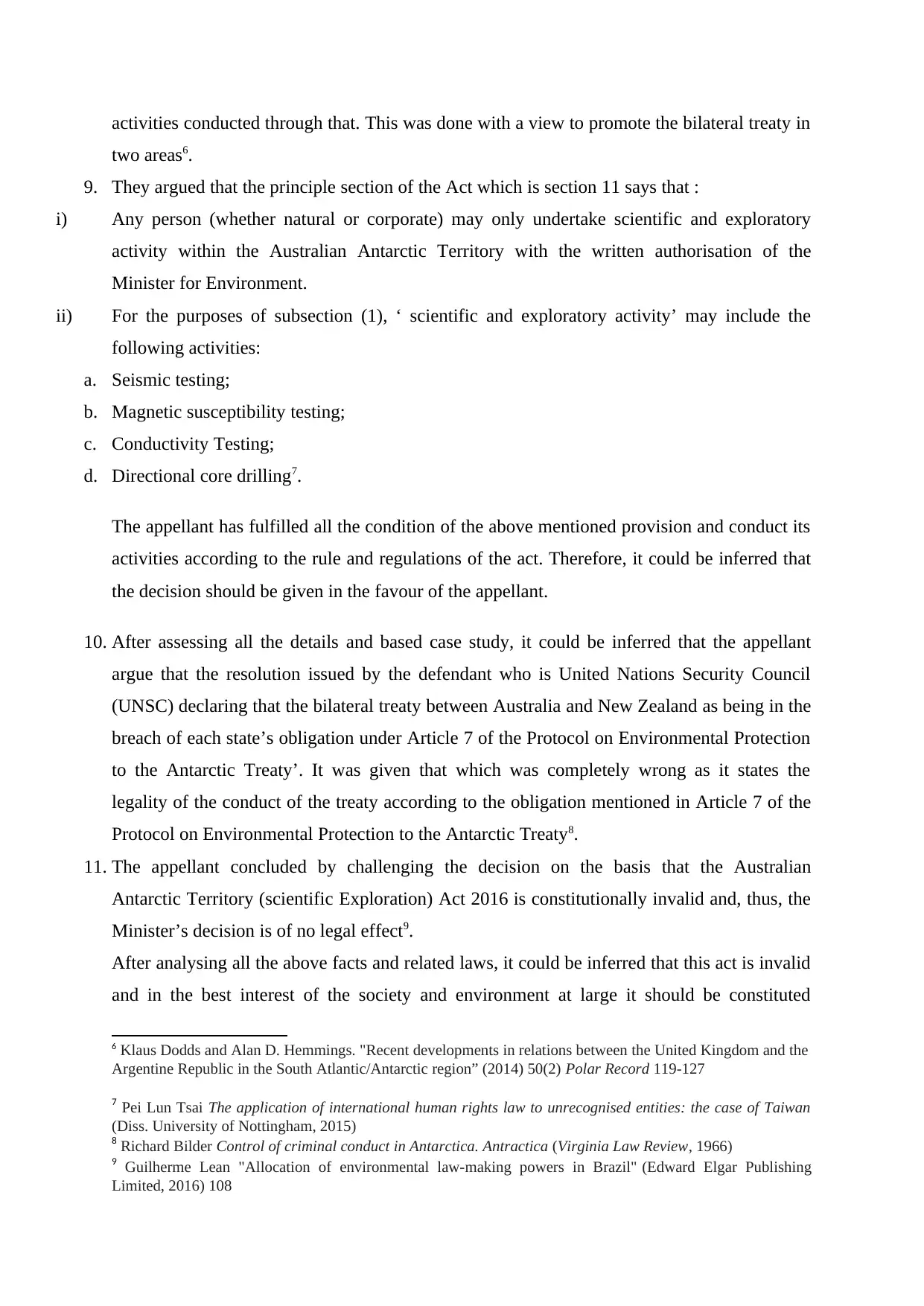
activities conducted through that. This was done with a view to promote the bilateral treaty in
two areas6.
9. They argued that the principle section of the Act which is section 11 says that :
i) Any person (whether natural or corporate) may only undertake scientific and exploratory
activity within the Australian Antarctic Territory with the written authorisation of the
Minister for Environment.
ii) For the purposes of subsection (1), ‘ scientific and exploratory activity’ may include the
following activities:
a. Seismic testing;
b. Magnetic susceptibility testing;
c. Conductivity Testing;
d. Directional core drilling7.
The appellant has fulfilled all the condition of the above mentioned provision and conduct its
activities according to the rule and regulations of the act. Therefore, it could be inferred that
the decision should be given in the favour of the appellant.
10. After assessing all the details and based case study, it could be inferred that the appellant
argue that the resolution issued by the defendant who is United Nations Security Council
(UNSC) declaring that the bilateral treaty between Australia and New Zealand as being in the
breach of each state’s obligation under Article 7 of the Protocol on Environmental Protection
to the Antarctic Treaty’. It was given that which was completely wrong as it states the
legality of the conduct of the treaty according to the obligation mentioned in Article 7 of the
Protocol on Environmental Protection to the Antarctic Treaty8.
11. The appellant concluded by challenging the decision on the basis that the Australian
Antarctic Territory (scientific Exploration) Act 2016 is constitutionally invalid and, thus, the
Minister’s decision is of no legal effect9.
After analysing all the above facts and related laws, it could be inferred that this act is invalid
and in the best interest of the society and environment at large it should be constituted
6 Klaus Dodds and Alan D. Hemmings. "Recent developments in relations between the United Kingdom and the
Argentine Republic in the South Atlantic/Antarctic region” (2014) 50(2) Polar Record 119-127
7 Pei Lun Tsai The application of international human rights law to unrecognised entities: the case of Taiwan
(Diss. University of Nottingham, 2015)
8 Richard Bilder Control of criminal conduct in Antarctica. Antractica (Virginia Law Review, 1966)
9 Guilherme Lean "Allocation of environmental law-making powers in Brazil" (Edward Elgar Publishing
Limited, 2016) 108
two areas6.
9. They argued that the principle section of the Act which is section 11 says that :
i) Any person (whether natural or corporate) may only undertake scientific and exploratory
activity within the Australian Antarctic Territory with the written authorisation of the
Minister for Environment.
ii) For the purposes of subsection (1), ‘ scientific and exploratory activity’ may include the
following activities:
a. Seismic testing;
b. Magnetic susceptibility testing;
c. Conductivity Testing;
d. Directional core drilling7.
The appellant has fulfilled all the condition of the above mentioned provision and conduct its
activities according to the rule and regulations of the act. Therefore, it could be inferred that
the decision should be given in the favour of the appellant.
10. After assessing all the details and based case study, it could be inferred that the appellant
argue that the resolution issued by the defendant who is United Nations Security Council
(UNSC) declaring that the bilateral treaty between Australia and New Zealand as being in the
breach of each state’s obligation under Article 7 of the Protocol on Environmental Protection
to the Antarctic Treaty’. It was given that which was completely wrong as it states the
legality of the conduct of the treaty according to the obligation mentioned in Article 7 of the
Protocol on Environmental Protection to the Antarctic Treaty8.
11. The appellant concluded by challenging the decision on the basis that the Australian
Antarctic Territory (scientific Exploration) Act 2016 is constitutionally invalid and, thus, the
Minister’s decision is of no legal effect9.
After analysing all the above facts and related laws, it could be inferred that this act is invalid
and in the best interest of the society and environment at large it should be constituted
6 Klaus Dodds and Alan D. Hemmings. "Recent developments in relations between the United Kingdom and the
Argentine Republic in the South Atlantic/Antarctic region” (2014) 50(2) Polar Record 119-127
7 Pei Lun Tsai The application of international human rights law to unrecognised entities: the case of Taiwan
(Diss. University of Nottingham, 2015)
8 Richard Bilder Control of criminal conduct in Antarctica. Antractica (Virginia Law Review, 1966)
9 Guilherme Lean "Allocation of environmental law-making powers in Brazil" (Edward Elgar Publishing
Limited, 2016) 108
Secure Best Marks with AI Grader
Need help grading? Try our AI Grader for instant feedback on your assignments.
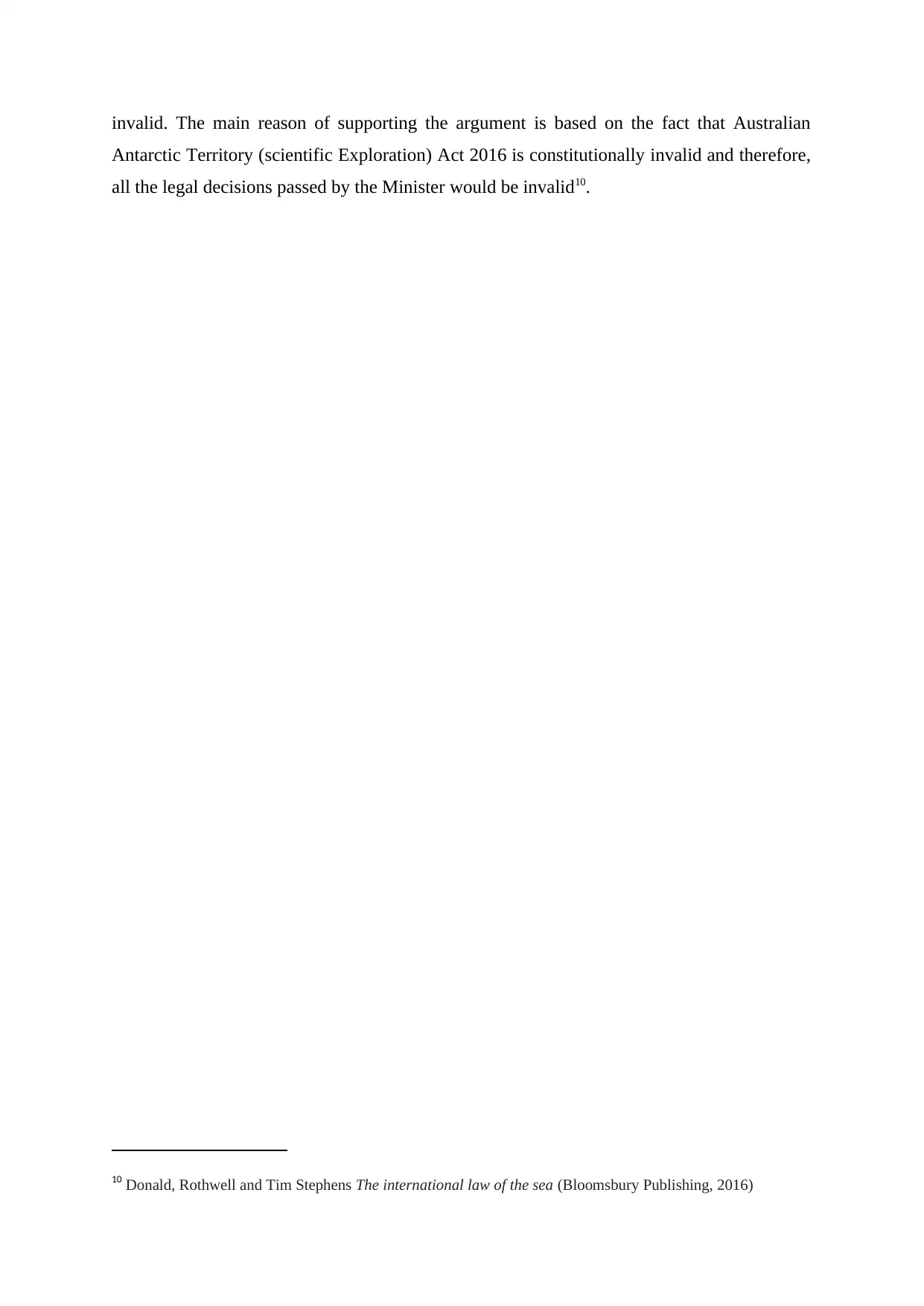
invalid. The main reason of supporting the argument is based on the fact that Australian
Antarctic Territory (scientific Exploration) Act 2016 is constitutionally invalid and therefore,
all the legal decisions passed by the Minister would be invalid10.
10 Donald, Rothwell and Tim Stephens The international law of the sea (Bloomsbury Publishing, 2016)
Antarctic Territory (scientific Exploration) Act 2016 is constitutionally invalid and therefore,
all the legal decisions passed by the Minister would be invalid10.
10 Donald, Rothwell and Tim Stephens The international law of the sea (Bloomsbury Publishing, 2016)
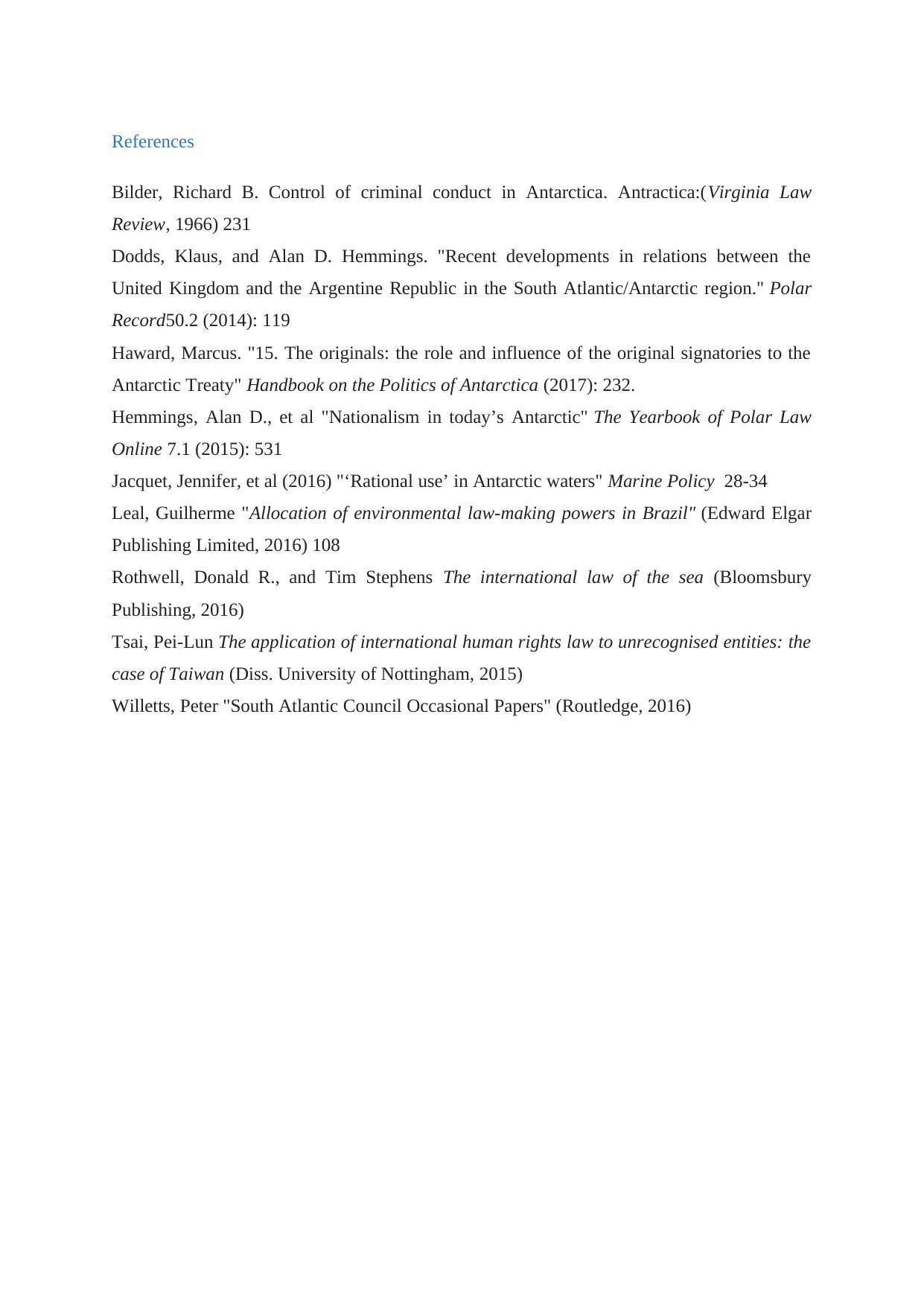
References
Bilder, Richard B. Control of criminal conduct in Antarctica. Antractica:(Virginia Law
Review, 1966) 231
Dodds, Klaus, and Alan D. Hemmings. "Recent developments in relations between the
United Kingdom and the Argentine Republic in the South Atlantic/Antarctic region." Polar
Record50.2 (2014): 119
Haward, Marcus. "15. The originals: the role and influence of the original signatories to the
Antarctic Treaty" Handbook on the Politics of Antarctica (2017): 232.
Hemmings, Alan D., et al "Nationalism in today’s Antarctic" The Yearbook of Polar Law
Online 7.1 (2015): 531
Jacquet, Jennifer, et al (2016) "‘Rational use’ in Antarctic waters" Marine Policy 28-34
Leal, Guilherme "Allocation of environmental law-making powers in Brazil" (Edward Elgar
Publishing Limited, 2016) 108
Rothwell, Donald R., and Tim Stephens The international law of the sea (Bloomsbury
Publishing, 2016)
Tsai, Pei-Lun The application of international human rights law to unrecognised entities: the
case of Taiwan (Diss. University of Nottingham, 2015)
Willetts, Peter "South Atlantic Council Occasional Papers" (Routledge, 2016)
Bilder, Richard B. Control of criminal conduct in Antarctica. Antractica:(Virginia Law
Review, 1966) 231
Dodds, Klaus, and Alan D. Hemmings. "Recent developments in relations between the
United Kingdom and the Argentine Republic in the South Atlantic/Antarctic region." Polar
Record50.2 (2014): 119
Haward, Marcus. "15. The originals: the role and influence of the original signatories to the
Antarctic Treaty" Handbook on the Politics of Antarctica (2017): 232.
Hemmings, Alan D., et al "Nationalism in today’s Antarctic" The Yearbook of Polar Law
Online 7.1 (2015): 531
Jacquet, Jennifer, et al (2016) "‘Rational use’ in Antarctic waters" Marine Policy 28-34
Leal, Guilherme "Allocation of environmental law-making powers in Brazil" (Edward Elgar
Publishing Limited, 2016) 108
Rothwell, Donald R., and Tim Stephens The international law of the sea (Bloomsbury
Publishing, 2016)
Tsai, Pei-Lun The application of international human rights law to unrecognised entities: the
case of Taiwan (Diss. University of Nottingham, 2015)
Willetts, Peter "South Atlantic Council Occasional Papers" (Routledge, 2016)
1 out of 6
Your All-in-One AI-Powered Toolkit for Academic Success.
+13062052269
info@desklib.com
Available 24*7 on WhatsApp / Email
![[object Object]](/_next/static/media/star-bottom.7253800d.svg)
Unlock your academic potential
© 2024 | Zucol Services PVT LTD | All rights reserved.